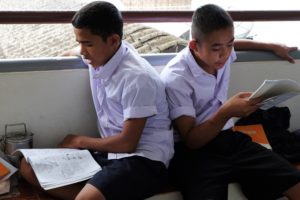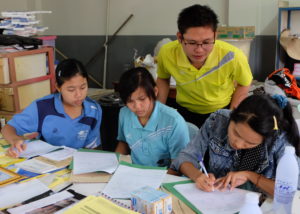
Migrant students preparing for the Burma/Myanmar Matriculation exam.
Thousands of migrant children have spent up to ten years at migrant learning centers (MLCs) without receiving official government recognition of their education, meaning their chances of future study and/or employment are limited, leaving them more vulnerable to exploitation.
Through Project for Local Empowerment (PLE) support, the Burmese Migrant Workers’ Education Committee (BMWEC) negotiated for migrant children to sit for Burma/Myanmar Government Grade 4 and 8 exams within Thailand and Grade 10 national matriculation exams across the border in Myawaddy, Burma. In addition, MLCs are providing a Thai non-formal education (NFE) program for those students intending to stay in Thailand for a longer period. This means students are now able to gain a recognized education in Burma and/or Thailand.
BMWEC now supports over 3,300 students that are studying towards accredited qualifications from both Thailand and Burma; more than 180 teachers that receive continuous specialized training, including training from Thai and Burma governments; and 60 graduates continuing their education at the university level. BMWEC works closely with community members to support education through cost share and income generation projects and local teacher associations.
As a result of the work of BMWEC:
- 270 children passed their exams in the 2015-16 academic year meaning they have a recognized education that can transfer to schools or universities in Burma and improves their chances to secure employment.
- Currently 58 migrant children from the Thai border are studying at Burma universities with a few accessing tertiary education in other countries, including the US.
The BMWECs mission is to develop each child’s personality, talents and abilities to the fullest. They outline this as encouraging children to respect the human rights of other people and to respect their own and other cultures and to help them to learn to live peacefully and protect the environment.

BMWEC staff preparing student enrollment documents for the Myanmar Matriculation exam.
About the Project for Local Empowerment
Each year, through the Project for Local Empowerment (PLE), a 6-year (2011 – 2017) USAID-funded project, World Education and their partners support 7,058 teachers to receive training, 271,930 learners in Burma and Thailand to access an education and 1,890 young adults through continuing education programs.
WE has been able to access to quality recognized education services for ethnic children and marginalized communities from Burma, with a number of pathways, including both formal and non-formal pathways officially accredited by the Governments of Burma and Thailand.
PLE Education activities are implemented through cooperation and capacity building of 11 local partner organizations.
Providing a safe learning environment for children
World Education Thailand has worked on refugee and migrant assistance programs in Thailand since 1980, particularly in education, helping to ensure a safe, secure environment for vulnerable children and their communities at risk or child trafficking, child labor and the worst forms of child labor.
The involvement and participation of children, parents and local communities in their schools is crucial as we move forward in the peacebuilding process.
Link to PLE Strategy: In PY6, PLE provides technical, organizational and human development support to BMWEC. This includes technical support to develop quality standards in migrant learning centers (MLCs), and further develop Parent Teacher Associations, in the areas of cost sharing and fundraising in order to provide services for the migrant youth in Tak Province. PLE continues to support BMWEC to assume the management of special education activities including the Starflower Center for children with disabilities.
Partnership period: 1st April 2014 – 31st July 2017
Project location(s): Thai-Burma Border
Project beneficiaries (direct & indirect): Migrant children and MLC teachers
